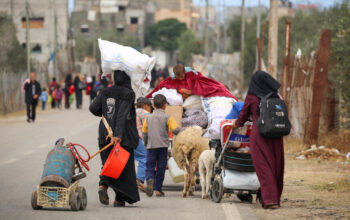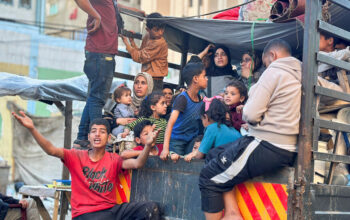
Protests erupted in more than a dozen cities across Iran on Tuesday over what some fear may be the poisoning of thousands of schoolgirls and the government’s inability to contain the growing crisis, videos posted on social media show.
“Death to the child-killing regime,” protesters chanted, some holding signs reading, “Protect the safety of schools,” the videos showed.
They were the first protests seen in multiple Iranian cities simultaneously after two months of relative calm. The large uprisings led by women and girls that rocked the nation toward the end of last year had largely fizzled after a brutal government crackdown that included mass arrests and the execution of four protesters.
But the school illnesses have reignited public fury, with many calling once again for an end to the Islamic Republic’s rule.
On Tuesday, hundreds of parents, teachers and ordinary citizens gathered outside schools and local offices of the Ministry of Education in Tehran, Shiraz, Mashhad, Rasht, Sanandaj and other cities. Students at several university campuses also held theatrical protests at which they lay on the ground and pretended to suffocate, videos showed.
In several cities, security forces unleashed tear gas against peacefully protesting teachers and parents and tried to arrest them, videos showed.
On Tuesday, the Interior Ministry announced that it had arrested a number of people in five provinces in connection with the episodes. The deputy interior minister, Majid Mohammadi, told state television that some of those arrested were “not enemies” and that in some instances students had carried out pranks by taking substances that provoked symptoms.
The Protests in Iran
The death of a young woman, Mahsa Amini, in the custody of the morality police led to a nationwide uprising against Iran’s theocratic rule.
The spokesman for the armed forces, Gen. Saeed Montazer Al-Mahdi, told Iranian news media that two men and three women had been arrested. He claimed they had carried out attacks to “create insecurity and chaos” and accused them of acting on behalf of foreign agents and news media.
The judiciary also targeted journalists, media publications and prominent public figures from the reformist political faction, accusing them of “spreading lies and rumors.” A journalist from Qom News, Ali Pour Tabatabei, was arrested on Sunday after months of leading the coverage of the illnesses that started in his hometown, the city of Qom.
Iranian schoolgirls began falling ill three months ago in Qom in what some government officials have characterized as attacks. Since then, the episodes have spread to over 200 schools, including college dormitories, in 27 of Iran’s 31 provinces, according to local new outlets and rights groups.
On Monday, one lawmaker, Mohammad Hassan Asafari, said that at least 5,000 students had sought medical treatment for symptoms of poisoning.
The explanation for the illnesses remains a mystery, and the theories offered by officials have run the gamut.
Some have spoken of deliberate poisoning with nitrogen gas, while others have suggested mass hysteria, unnamed enemies, opposition groups and the foreign news media. Some rights activists say that Islamist extremist groups opposed to educating girls might be responsible, which would be unusual because girls’ education had never been contested or attacked in Iran. Many others blame the government for the episodes and say they are part of a systematic crackdown on teenagers for participating in protests.
Iran’s supreme leader, Ayatollah Ali Khamenei, said on Monday that the “poisoning” of schoolchildren was “a big and unforgivable crime” and that perpetrators must face the maximum penalty.
Parents interviewed in Iran said that they were terrified of sending their children to school and that they did not trust the government investigation.
“I am not sending my son to school as long this situation continues — I will not risk something happening to him for the sake of education,” said Pooneh, a 47-year-old mother in the city of Varamin who, like others interviewed, insisted that her surname not be used for fear of retribution.
Shaghayegh, a 41-year-old mother and chemical engineer, said that parents at the private high school where her daughter is a junior had rejected reassurances from the principal that their children were safe.
“My daughter and all her classmates have collectively refused to attend school and forced it into providing online classes,” Shaghayegh said in an interview. “Our priority is the health of our children not education right now.”
A 45-year-old mother in Karaj named Fariba said that only a few students had attended classes at her daughter’s high school. “My husband and I have decided not to send our daughter to school until her safety and health is guaranteed,” she said, adding that even if she allowed her daughter to return to school, she or her husband would sit outside the building.
Twenty prominent Iranian lawyers inside and outside the country have called on the United Nations to investigate the school illnesses. In a letter, they said the government lacked the competence and willingness to investigate, and noted its track record of violence against women and girls.
Leily Nikounazar contributed reporting.


